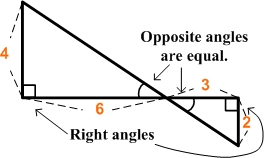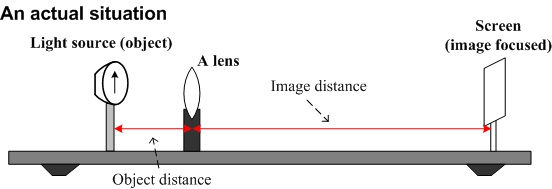How to Derive the Thin Lens Equation
(1/do)+(1/di)=(1/f)
If your operating system is not capable of viewing this animation, clickA thin lens is defined as a lens with a thickness that is approximately ignorable compared with the radii of curvature of the lens. If a lens is thicker than that measure, the thin lens equation cannot be used.
Due to the geometrical symmetry, the thin lens equation can be used for a convex and concave mirrors.
Please note the following so you can understand how the thin len equation can be derived:

Waning! This animation uses sounds. Before you start, check the volume of your computer.
Here is an additional information. The object and image distances have to be taken from the
center of the lens as shown below. Then, you can prove the thin lens equation works.

Do you need a physics tutor?

You can have a great instruction of physics!
